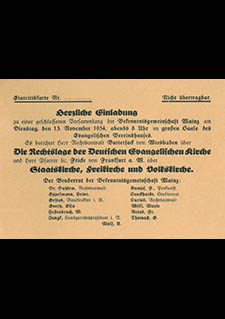The Confessing Church’s Attorney
Buttersack was active in the congregation of the Protestant Bergkirche in Wiesbaden and a member of the church council. Following the “seizure of power”, the congregation of the Bergkirche with its pastor Franz von Bernus (1882–1959) was regarded as the center of resistance in Wiesbaden against the National Socialist German Christians.
Buttersack provided legal advice and organized the protest and became the Pastors' Emergency League legal counsel in November of 1933. On January 3, 1934, Buttersack sent a letter to the Protestants in Wiesbaden in which he reminded them, in view of the ban on active involvement in matters of church policy by pastors and church officials in Nassau, of their responsibility as congregational members to fight for the freedom to preach the Gospel.
Buttersack attended the German Evangelical Church’s second confessional synod in Dahlem (October 19-20, 1934) as Nassau’s delegate. At the end of October, the Regional Council of Brethren of the Confessing Church in Nassau-Hessen was constituted, which was subordinate to the National Council of Brethren. Buttersack was also a member of the Regional Council of Brethren.
A dauntless attorney for pastors of the Confessing Church against the German Christian church government under Regional Bishop Ernst Ludwig Dietrich (1897–1974) and for victims of political persecution, Buttersack was an enduring nuisance to the German Christians and the Nazi regime.
At the request of the president of the district church congress in Wiesbaden, Buttersack was dismissed from the Bergkirche church council in 1934 on account of his committed stand for pastors in Wiesbaden who had been removed from office. Allegedly, his efforts on behalf of these pastors had caused anxiety among the laity of the church and were impeding the church government’s work.
In June of 1936, proceedings were opened before the court of honor of the “National Socialist Legal Workers' Association” against Buttersack for having supported aims hostile to the state as jurist for the Confessing Church and as a Gauführer of the “Stahlhelm”. Moreover, he had represented a Jewess in a labor court case. In a libel case in January of 1937, in which he represented a pastor of the Confessing Church against a German Christian pastor, Buttersack was accused of employing Jewish practices, which the Third Reich had vanquished. When he defended himself against the accusation, he was threatened with consequences.
His son Christian (1910–1989) likewise had to suffer under the regime’s repression. The Gestapo forbade his ordination in Wiesbaden in October of 1937 without stating any reasons. In response to this step, he briefly entered the employment of the Württemberg Regional Church, which provided the vicar from Nassau-Hessen a refuge. Upon his return, he was barred from entering a church in which he was to hold the service in June of 1938. He consequently reattempted to go to Württemberg.
Source / title
- © Zentralarchiv der Evangelischen Kirche in Hessen und Nassau, 0901/14

